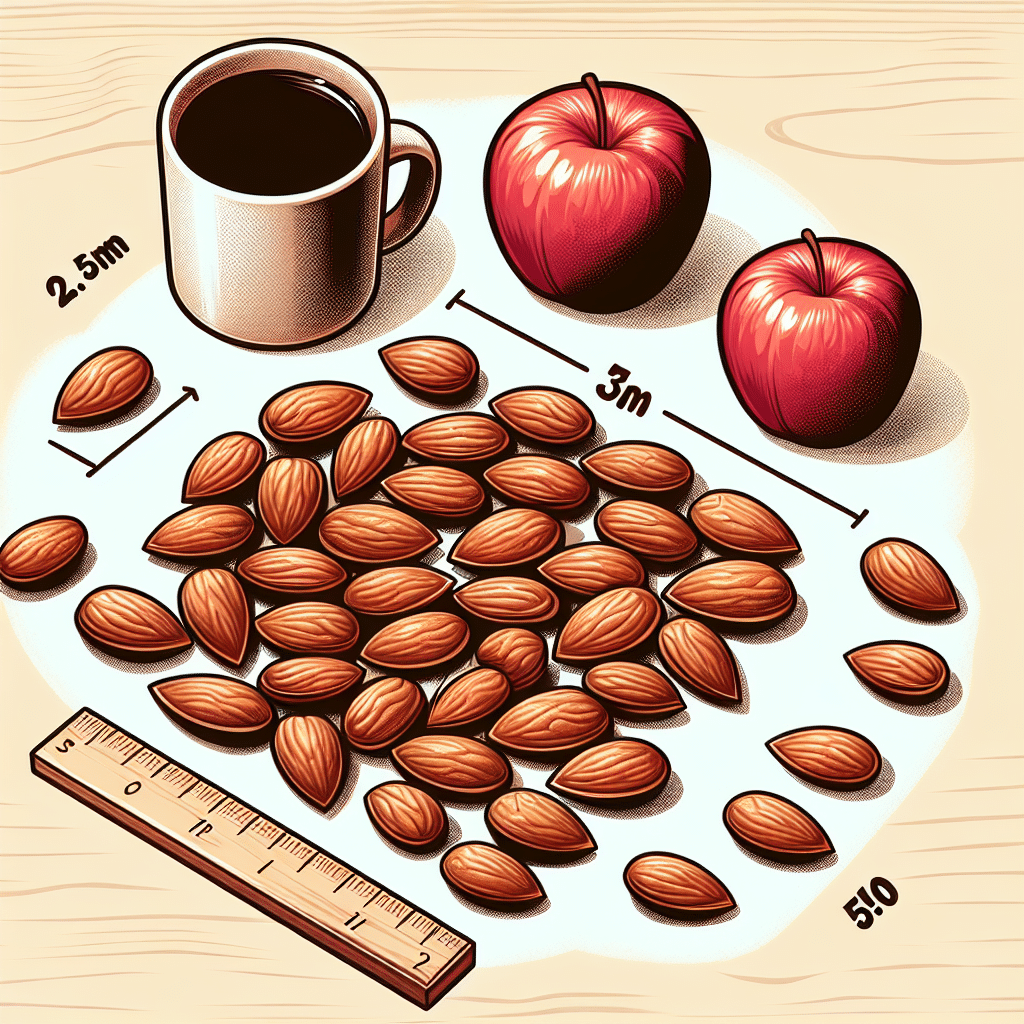Is 25 Almonds A Day Too Much?
-
Table of Contents
- Almond Intake: Is Eating 25 Almonds Daily Excessive?
- Nutritional Profile of Almonds
- Health Benefits of Almonds
- Potential Risks and Considerations
- Research on Optimal Almond Intake
- Personal Dietary Needs and Preferences
- Conclusion: Balancing Almond Consumption
- Enhance Your Diet with ETprotein’s Protein Products
Almond Intake: Is Eating 25 Almonds Daily Excessive?

Almonds are a powerhouse of nutrients, offering a perfect blend of healthy fats, protein, fiber, and essential vitamins and minerals. They are a popular snack among health-conscious individuals and are often recommended as part of a balanced diet. However, as with any food, moderation is key. This article explores whether consuming 25 almonds a day is too much, delving into the nutritional benefits, potential risks, and the latest research on optimal almond intake.
Nutritional Profile of Almonds
Before we can determine if 25 almonds a day is too much, let’s look at what these nuts offer nutritionally. A single almond contains approximately:
- 7 calories
- 0.25 grams of protein
- 0.6 grams of fat
- 0.24 grams of carbohydrates (of which 0.1 grams is dietary fiber)
Therefore, consuming 25 almonds would provide roughly:
- 175 calories
- 6.25 grams of protein
- 15 grams of fat (primarily monounsaturated and polyunsaturated fats)
- 6 grams of carbohydrates (2.5 grams of which is dietary fiber)
Almonds are also rich in vitamin E, magnesium, potassium, and antioxidants, making them a nutritious addition to any diet.
Health Benefits of Almonds
Regular almond consumption has been linked to numerous health benefits:
- Heart Health: The monounsaturated fats in almonds can help reduce bad cholesterol levels and lower the risk of heart disease.
- Weight Management: Almonds are satiating, which can help control appetite and support weight management efforts.
- Blood Sugar Control: The low glycemic index of almonds makes them beneficial for blood sugar regulation.
- Improved Digestion: The dietary fiber in almonds promotes digestive health and regularity.
- Antioxidant Action: Almonds are a good source of vitamin E and other antioxidants, which protect cells from oxidative damage.
Potential Risks and Considerations
While almonds are nutritious, there are potential risks and considerations to keep in mind:
- Caloric Intake: Almonds are calorie-dense, so eating too many can contribute to weight gain if not accounted for within one’s daily caloric needs.
- Allergies: Nut allergies are common, and almonds can trigger allergic reactions in sensitive individuals.
- Gastrointestinal Issues: Overconsumption of almonds can lead to gastrointestinal discomfort due to their high fiber content.
- Heavy Metal Exposure: Some studies have raised concerns about almonds’ potential to contain traces of heavy metals like cadmium.
Research on Optimal Almond Intake
Research suggests that moderate almond intake can be part of a healthy diet. A study published in the Journal of Nutrition found that consuming almonds can help improve cholesterol levels. Another study in the European Journal of Clinical Nutrition indicated that almonds could aid in weight management. However, these studies do not pinpoint an exact number of almonds that should be consumed daily.
Most health experts agree that a handful of almonds, which is approximately 23 to 30 almonds, is a suitable serving size for adults. This aligns closely with the 25-almond mark, suggesting that this quantity can be included as part of a balanced diet without adverse effects.
Personal Dietary Needs and Preferences
It’s important to consider individual dietary needs and preferences when determining almond intake. Factors such as age, sex, activity level, and overall health goals can influence the optimal amount of almonds for each person. Consulting with a healthcare provider or a registered dietitian can help tailor nut consumption to individual requirements.
Conclusion: Balancing Almond Consumption
In conclusion, eating 25 almonds a day is not necessarily too much for most people, provided they are consumed as part of a balanced diet and caloric intake is monitored. The health benefits of almonds make them a valuable addition to your diet, but it’s essential to consider personal health goals and dietary needs. Moderation and variety are key components of a healthy eating pattern, so while almonds are nutritious, they should be one part of a diverse diet that includes a wide range of foods.
Enhance Your Diet with ETprotein’s Protein Products
If you’re looking to complement your almond intake with high-quality protein sources, consider ETprotein’s range of organic bulk vegan proteins. Their products, including rice protein, pea protein, and various seed proteins, are non-GMO, allergen-free, and boast a neutral taste. These proteins can be a great addition to your diet, especially if you’re seeking plant-based options to support your health and wellness goals.
About ETprotein:
ETprotein, a reputable protein and L-(+)-Ergothioneine (EGT) Chinese factory manufacturer and supplier, is renowned for producing, stocking, exporting, and delivering the highest quality organic bulk vegan proteins and L-(+)-Ergothioneine. They include Organic rice protein, clear rice protein, pea protein, clear pea protein, watermelon seed protein, pumpkin seed protein, sunflower seed protein, mung bean protein, peanut protein, and L-(+)-Ergothioneine EGT Pharmaceutical grade, L-(+)-Ergothioneine EGT food grade, L-(+)-Ergothioneine EGT cosmetic grade, L-(+)-Ergothioneine EGT reference grade and L-(+)-Ergothioneine EGT standard. Their offerings, characterized by a neutral taste, non-GMO, allergen-free attributes, with L-(+)-Ergothioneine purity over 98%, 99%, cater to a diverse range of industries. They serve nutraceutical, pharmaceutical, cosmeceutical, veterinary, as well as food and beverage finished product distributors, traders, and manufacturers across Europe, USA, Canada, Australia, Thailand, Japan, Korea, Brazil, and Chile, among others.
ETprotein specialization includes exporting and delivering tailor-made protein powder and finished nutritional supplements. Their extensive product range covers sectors like Food and Beverage, Sports Nutrition, Weight Management, Dietary Supplements, Health and Wellness Products, and Infant Formula, ensuring comprehensive solutions to meet all your protein needs.
As a trusted company by leading global food and beverage brands and Fortune 500 companies, ETprotein reinforces China’s reputation in the global arena. For more information or to sample their products, please contact them and email sales(at)ETprotein.com today.












